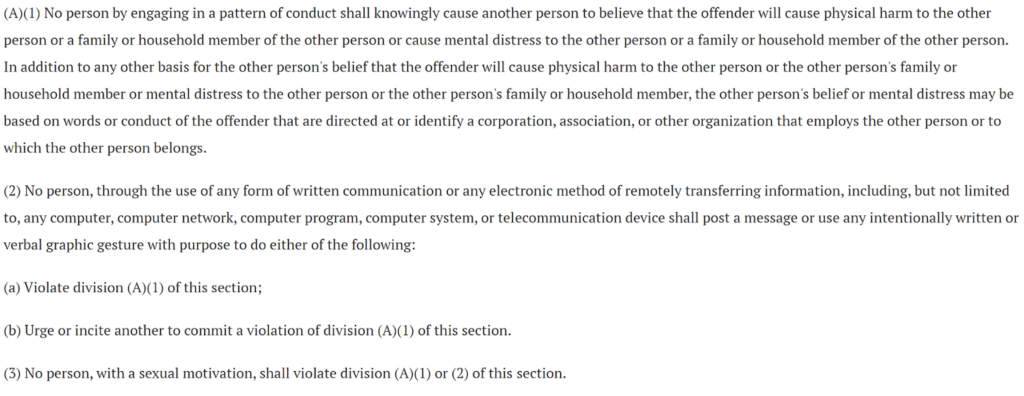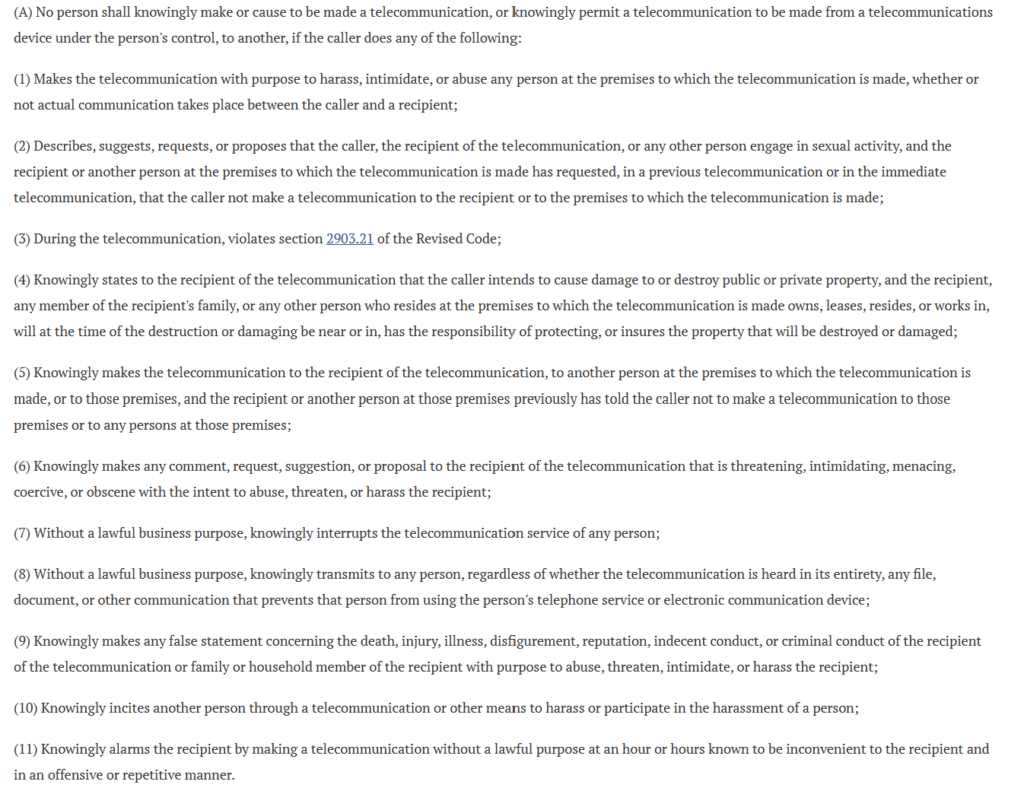Is Doxxing Illegal In Ohio?
- Doxxing
- Is Doxxing Illegal?
- Is Doxxing Illegal In Ohio?
Table of Contents
If you live in Ohio and are concerned about your online privacy, you might be wondering: Is doxxing illegal in Ohio?
In this guide, we’ll look at the legal ramifications of sharing Ohio residents’ information online without their permission, along with the crimes that are related to, and can stem from, doxxing.
Is Doxxing Illegal in Ohio?
No. The act of doxxing, which refers to publishing someone’s personal information without their consent, is not illegal in Ohio.
Doxxing Related Activities That Are Illegal In Ohio
Even though doxxing is not illegal in Ohio, the state does criminalize other activities that are related to (or can happen as a result of) doxxing.
These include menacing, menacing by stalking, telecommunications harassment, swatting, and extortion.
Menacing
Menacing (section 2903.22 of the Ohio Revised Code) in Ohio refers to when a perpetrator causes you to believe that you, your personal property, your unborn child, or your family members are in danger of physical harm.

Those found guilty of menacing in Ohio face a fourth-degree misdemeanor, which can result in up to 30 days in jail and a $250 fine.
Menacing by stalking
In situations where someone is engaging in a pattern of conduct that causes you to believe that you, your family, or your household members are in danger, they can be charged with menacing by stalking in Ohio as per section 2903.211 of the Ohio Revised Code.
Importantly, Ohio includes specific references to repeated electronic communications in its legal code, meaning if you’ve been doxxed and someone is menacing you online via chat messages or emails, it might be defined as “menacing by stalking” and, therefore, be an illegal act.

The penalty for menacing by stalking in Ohio is a first-degree misdemeanor, entailing up to a year in jail and a $500 fine.
In some cases, like if the victim is a minor or if the offender has a history of violence towards the victim or someone else, menacing by stalking can be a felony of the fourth degree, which can result in up to 18 months of imprisonment and a fine of up to $5,000.
Telecommunications harassment
Making phone calls to someone with the intention to “harass, intimidate, or abuse” them is a breach of Ohio’s telecommunications harassment law (section 2917.21 of the Ohio Revised Code).
There are different subsections to the code that outline particular transgressions – such as if the perpetrator calls a person at an hour or hours inconvenient to them and in an offensive and repetitive way – but they all generally result in a first-degree misdemeanor. In Ohio, that nets up to one year’s imprisonment and a fine of up to $500.

Subsequent offenses of this charge escalate to a fifth-degree felony, equating to imprisonment for up to a year and up to $2,500 in fines.
Swatting
One of the most dangerous activities related to doxxing is swatting, which occurs when a perpetrator knowingly makes a false report to law enforcement about illegal activity happening in your home or workplace.
Swatting can result in rapid and aggressive police responses, some of which have been fatal for swatting victims.
Swatting is illegal in Ohio under section 2917.321 of the Ohio Revised Code.

In Ohio, first-time swatters are guilty of a fourth-degree felony, which comes with 6-18 months of jail time and a fine of up to $5,000.
Extortion
In Ohio, the act of extortion (section 2905.11 of the Ohio Revised Code) refers to threatening to commit any felony or violence, threatening “any calumny against any person,” or exposing any matter that causes hatred toward someone or their business.

Those found guilty of extortion in Ohio face a felony of the third degree, amounting to between 9-36 months in prison and a fine of up to $10,000.
Is Doxxing Illegal at the Federal Level?
As it stands, doxxing is not illegal in the United States at the federal level.
This is, in part, due to the large amount of information that exists in the public sphere about any given individual.
That said, a growing number of states, including California, Illinois, and Arizona, are taking steps to protect their residents from doxxing.
However, since legal action is reactive rather than proactive, you shouldn’t rely on the legal system to protect yourself. Instead, you should make yourself as undoxxable as possible.
How to Protect Yourself Against Doxxing In Ohio (And Elsewhere)
If your goal is to make yourself undoxxable, your first step should be to dox yourself (refer to our guide to doxxing yourself and list of doxxing tools for more information). By using the same techniques as doxxers, you can preemptively see where your data vulnerabilities are.
To protect yourself from doxxers, you’ll most likely need to:
- Change your social media profile settings from public to private to hide your biographical information.
- Change your post settings so that only friends and people you know can see what you post.
- Opt out of data brokers. Data brokers are companies that make money by compiling publicly available information on individuals and then selling it to anyone willing to pay a minimal fee. Opting out is not a one-time process, as these companies refresh their databases when new information is identified, meaning you’ll need to repeat the opt-out process regularly. Alternatively, subscribe to a data broker removal service like DeleteMe.
- Stop sharing personal information in public places online.
- Use unique usernames and passwords with your online accounts to make yourself less traceable.
Looking for more information? Read our guide on how to prevent doxxing.
Don’t have the time?
DeleteMe is our premium privacy service that removes you from more than 30 data brokers like Whitepages, Spokeo, BeenVerified, plus many more.
Save 10% on DeleteMe when you use the code BLOG10.
Hundreds of companies collect and sell your private data online. DeleteMe removes it for you.
Our privacy advisors:
- Continuously find and remove your sensitive data online
- Stop companies from selling your data – all year long
- Have removed 35M+ records of personal data from the web
Special Offer
Save 10% on any individual and family privacy plan with code: BLOG10
